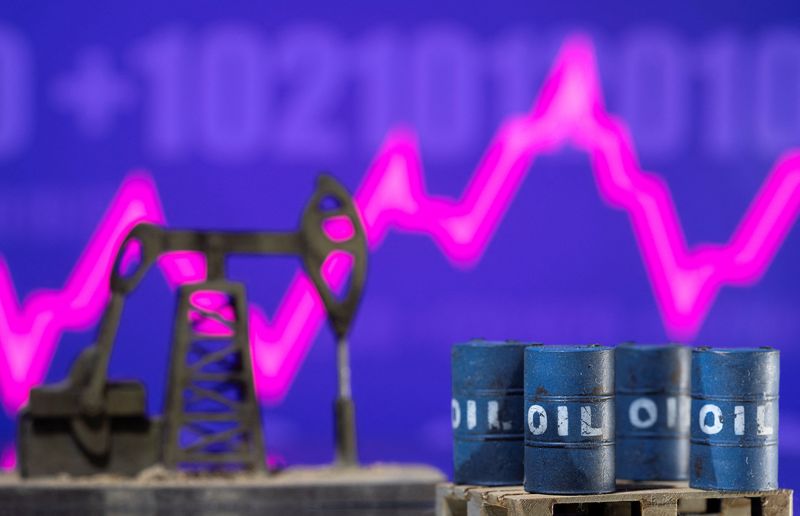By David Gaffen
NEW YORK (Reuters) -Oil surged relentlessly beyond $110 a barrel on Wednesday, extending its rally since Russia invaded Ukraine seven days ago, on expectations that the market will remain short of supply for months to come following sanctions on Moscow and a flood of divestment from Russian oil assets by major companies.
The market rallied into the close of trading on heavy volume, with global benchmark Brent crude ending the day at its highest close since June 2014, while U.S. crude's settlement was its highest since May 2011.
The oil rally has been dramatic, with Brent gaining over 15% this week alone as the West responded to Moscow's invasion with numerous sanctions, which have targeted financial transactions and banks, designed to hammer Russia's economy.
While the energy sector was not specifically targeted, the sanctions have hampered exporting capabilities from Russia, whose oil exports account for about 8% of global supply, or 4 million to 5 million barrels per day, more than any nation other than Saudi Arabia.
"It increasingly looks like the market is pricing in a supply disruption to at least part of the nearly 4 million barrels per day of oil that is sold into the U.S. and EU," said Andrew Lipow, president of Lipow Oil Associates in Houston.
Brent crude futures peaked at $113.94 a barrel during the session, before settling at $112.93, up $7.96, or 7.6%.
U.S. West Texas Intermediate (WTI) crude futures hit a high of $112.51 a barrel, and closed $7.19, or 7%, higher at $110.60.
"Demand destruction - through still higher prices - is now likely the only sufficient rebalancing mechanism," said Goldman Sachs (NYSE:GS) analyst in a note.
Relief in the form of more supply is unlikely in the near-term. The Organization of the Petroleum Exporting Countries and allies - which include Russia - stuck to their long-term plan to boost output by just 400,000 barrels per day at a brief meeting on Wednesday.
Even as the producer group, known as OPEC+, has increased output for the last several months, member states are routinely falling short of their targets, widening a gap that can only be filled by dipping into stockpiles.
Current worldwide demand has roughly reached pre-pandemic levels, and there is inadequate supply, causing large countries to dip into their stockpiles to make up for the shortfall.
Refiners and other buyers of oil are scrambling. Prominent grades of crude oil traded worldwide, such as those in the North Sea and the Middle East, are at record premiums above Brent.
At the same time, the key Russian Urals grade is being discounted at $18 lower than the benchmark - and prospective sellers are still finding little interest in Russian oil. On Wednesday, Russia's Surgutneftegaz was unable to sell 880,000 tonnes of Urals oil from Russian ports, following cancellations of other proposed sales.
Adding fuel to the fire, the White House on Wednesday said it was "very open" to the possibility of targeting Russian oil-and-gas with sanctions. That could drive prices even higher, analysts said, until consumers start to balk at the rising costs.
The United States has attempted to thread the needle between actions that will hurt global oil markets and those aimed at Russia. On Wednesday, the U.S. imposed new export curbs on specific refining technologies, intended to hurt Russia's oil refining sector down the road.
Trade in Russian oil was already in disarray as producers postponed sales, importers rejected Russian ships and buyers worldwide searched elsewhere for crude as Western sanctions and pullouts by private companies squeezed Russia.
On Wednesday, merchant trader Trafigura said it had frozen its investments in Russia, a day after numerous global oil majors announced plans to divest of their Russian investments, including Exxon Mobil (NYSE:XOM), BP (LON:BP) and Shell (LON:RDSa).
U.S. oil inventories continued to decline, meanwhile. The key Cushing, Oklahoma crude hub's tanks were at their lowest since 2018, while the U.S. strategic reserves dropped to a near 20-year low - and that was before another release announced by the White House on Tuesday in tandem with other industrialised nations. [EIA/S]

That release of 60 million barrels of oil agreed by International Energy Agency member countries failed to reassure the market and prices extended their rally.
"Given the 100 million bpd oil demand market, 60 million barrels satiates slightly over half a day of demand...and barely gets the market past lunchtime," wrote RBC Capital Markets analyst Michael Tran.
(Additioanl reporting by Sonali Paul in Melbourne and Muyu Xu in Beijing; Editing by Marguerita Choy and Kirsten Donovan)